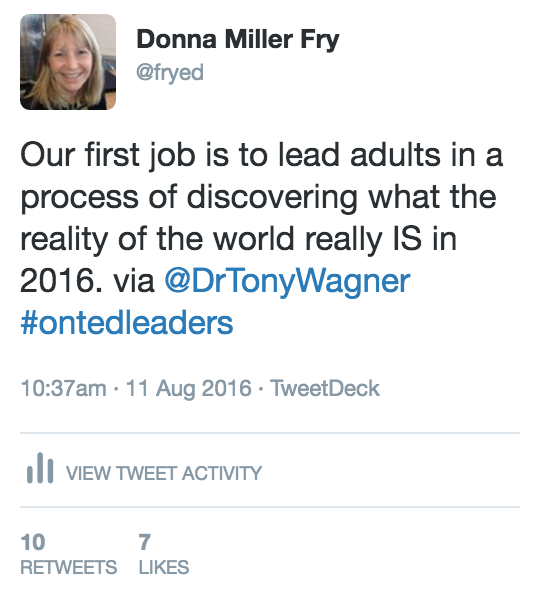It was an incredible honour yesterday, to hear Dr. Tony Wagner speak about his work in rethinking education for today. Being able to ask my question about how we work with a system that still defines graduates by 2-digit numbers, and ranks them individually, was enlightening and empowering.
I am a huge fan of Dr. Tony Wagner’s work.
On the plane home, I am reading (again) his book, “Most Likely to Succeed: Preparing our Kids for the Innovation Era”. I have shared excerpts from this book before. Today, though, I am intrigued by the ideas on p. 223.
“What does it mean to be an educated adult in the twenty-first century?”
We are entrenched in a digital economy. Time and time again, during the TELL 2016 conference, presenters expressed their frustration with how unaware educators seem to be with how fast change is happening.

Computers can now learn for themselves. In January 2016, a computer beat a professional GO player. This is orders of magnitude more significant than “Deep Blue” beating Kasparov at chess, and Watson beating Ken Jennings at Jeopardy!
Driverless cars are a reality, and $20.00 per hour jobs to ride in them are old news. Canada will be short 182000 people able to work in the digital economy by 2019 – essentially two years from now. Robots are, right now, replacing large numbers of standardized workers. Walmart is replacing warehouse workers with drones this fall. We have a crisis looming. Robots are replacing every paid position that is standardized.
TELL2016 presenter Carl Bull suggested that as comfortable educators, quite able to pay our mortgages, it is arrogant of us to ignore the reality that we have no idea how our students will achieve the same standard of living.
I deeply question why we continue to hire leaders and decision-makers in education who have no understanding of digital technologies. I wonder why the qualification courses our leaders are required to take have little mention of the importance of technology for learning.
I wonder why digital professional portfolios are seen as an “unfair advantage” instead of a non-negotiable part of the application process for leadership positions.
This week I saw many principals presenting at TELL2016, desperately working to create the compelling case for change.
I wonder who is listening.
I wonder when we will finally see that the vast array of digital competencies are essential for leaders, in this public education system tasked with preparing our youth to thrive in a digital world that many education leaders cannot even imagine.
Featured image by Dean Shareski CC-BY-NC-2.0
Further references:
Innovative leadership is needed by Tom Whitby
And a Key to the Future by David Culberhouse

Hi Donna!
As always, you make many good points and ask some very challenging questions. I am not sure if you are aware of it, but four cohorts of educational leaders have now completed the Leadership for Learning Academy (“developed in partnership with OCSOA, OPSOA and AGEFO and is intended to provide Ontario Directors and Superintendents with an opportunity to engage in an inquiry based professional learning experience that focus on system – wide innovation and technology enabled pedagogical practice.” From their website of course resources). That means that teams of education leaders have been meeting, planning, strategizing and delving into some of the issues you are exploring. Perhaps it harkens change? It certainly represents the desire for more understanding and a forum for discussion and action.
I wish I had known TELL was on. Sometimes I think we just don’t know about all of the events happening. Thank you for voicing some of what is going on and sharing your thinking in such a visible (and enjoyable) format!
Mary
Hi Mary. Thank you for taking the time to comment on this. It is very encouraging to hear about the learning you are referring to. I was happy to share the work that you are doing in your board several times with the leaders at TELL2016.
It’s exciting to hear about leaders learning together. I hope that those cohorts will learn about the power of doing that openly, sharing their learning through blogs and social networks where others can learn from them too. That will model the learning process, a powerful way to lead, and show the rest of the province that this learning is actually very important.
There are amazing collaborative inquiries happening in Ontario. Some boards commit to openly sharing this work. Imagine the power and potential of all sharing their learning openly, flattening hierarchies, sharing evidence, challenging thinking.
This is already happening. We just need all voices involved.
You give me hope!